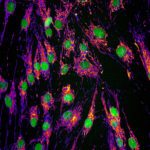Link to Pubmed [PMID] – 20130269
Biol. Reprod. 2010 Jul;83(1):52-62
Mammalian mitochondrial DNA (mtDNA) is a small, maternally inherited genome that codes for 13 essential proteins in the respiratory chain. Mature oocytes contain more than 150 000 copies of mtDNA, at least an order of magnitude greater than the number in most somatic cells, but sperm contain only approximately 100 copies. Mitochondrial oxidative phosphorylation has been suggested to be an important determinant of oocyte quality and sperm motility; however, the functional significance of the high mtDNA copy number in oocytes, and of the low copy number in sperm, remains unclear. To investigate the effects of mtDNA copy number on fertility, we genetically manipulated mtDNA copy number in the mouse by deleting one copy of Tfam, an essential component of the mitochondrial nucleoid, at different stages of germline development. We show that males can tolerate at least a threefold reduction in mtDNA copy number in their sperm without impaired fertility, and in fact, they preferentially transmit a deleted Tfam allele. Surprisingly, oocytes with as few as 4000 copies of mtDNA can be fertilized and progress normally through preimplantation development to the blastocyst stage. The mature oocyte, however, has a critical postimplantation developmental threshold of 40 000-50 000 copies of mtDNA in the mature oocyte. These observations suggest that the high mtDNA copy number in the mature oocyte is a genetic device designed to distribute mitochondria and mtDNAs to the cells of the early postimplantation embryo before mitochondrial biogenesis and mtDNA replication resumes, whereas down-regulation of mtDNA copy number is important for normal sperm function.

